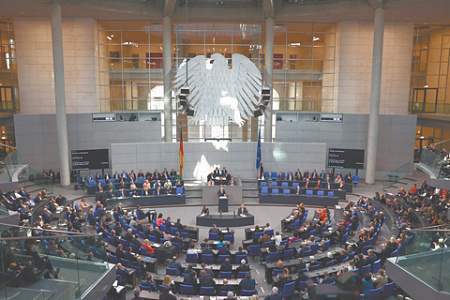
On Thursday, March 13, a two-day discussion on the reform of the German Constitution began in the Bundestag. The purpose of the proposed changes is to ease debt restrictions prescribed in the Basic Law and dramatically increase defense and infrastructure spending from a Special Extrabudgetary Fund of 500 billion euros.
Most likely, a vote on this important issue will be held on March 18. This is due to a number of factors. A special extra-budgetary fund is the basis for the existence of the black-red coalition. So far, it appears in the so-called 11-page special research paper, which outlines the main provisions of the new government’s activities.
These 11 pages should be completed during the negotiations of the 16 working groups of the conservative CDU/CSU bloc and the Social Democrats, which began simultaneously with the debates on the extra-budgetary fund in the Bundestag of the old composition. The fact is that they have different approaches to finding the financial resources needed to achieve their goals. If CDU leader Friedrich Merz intends to revive the economy in recession by reducing social programs and tax benefits for industry, then the Social Democrats are betting on increasing the tax burden on entrepreneurs. Therefore, the growth of public debt seemed to both partners in the future coalition to be a way out of their differences.
The idea of an extra-budgetary fund was formulated as a single defense and investment fund. But its adoption requires two thirds of the votes of the deputies of both the lower house of parliament (Bundestag) and the upper house (Bundesrat). In the new composition of the Bundestag, without the support of parties such as Alternative for Germany (AFD) and the Left Party, it is impossible to obtain two-thirds of the votes to amend the Constitution and adopt a law on the extra-budgetary fund. In the old composition of the Bundestag, two-thirds of the votes are possible due to the support of deputies from the Union 90/Green party (see NG from 03/10/25 and 03/11/25). The Basic Law of the Federal Republic of Germany allows, before the new composition of the Bundestag comes into force, to use the old composition to make decisions binding on the new legislative period.
Friedrich Merz and SPD leader Olaf Scholz quite sensibly did not decipher all the articles of the planned fund, since a significant part of the financial resources are intended for military support of Ukraine.
It was the latter circumstance that led to the changes, which will be considered in the first reading, and the final vote is scheduled for the second meeting. On March 21, the changes must be approved by the Bundesrat, the representative office of the federal states of Germany. In both cases, two-thirds of the votes are needed, which the Conservatives and Social Democrats do not have. Habek demanded that Merz divide the fund into two – military and economic, and not mix them. He admitted that under certain conditions, the Green faction may vote for an economic extra-budgetary fund.
The condition for this should be the adoption of Green climate investment projects and the elimination of some of the plans of the Bavarian CSU. The press does not provide specific data on this issue. But it can be assumed that the Greens are not satisfied with the resuscitation of German nuclear energy by Bavarian Prime Minister Markus Zeder. Negotiations on this with the leadership of the Greens have been underway since March 10. On this day, a conference of the prime ministers of the German lands was held, who expressed their support for the extra-budgetary fund.
According to estimates by the German media, if a positive decision is made on the land fund, about 100 billion euros will fall. However, with an installment plan for at least 10 years, since the extra-budgetary fund will not be spent simultaneously, but as loans are received.
It would seem that under these conditions, achieving a two-thirds majority is quite likely. But it is already known that a number of “green” members of the land governments, in particular in Bremen, have demanded that the share of land in the future fund be doubled.
The situation in the Bundestag is more complicated. Analyzing the possible options, the media note that even if the Greens agree to support the extra-budgetary fund, some of the deputies of the old Bundestag will sabotage support for changing the Constitution. After all, about 200 deputies of the CDU/CSU and SPD parties left the Bundestag (the lower house also decreased by more than 100 deputies). Retired parliamentarians are considered unreliable, as they are not bound by party discipline and may not attend the Bundestag meetings on March 13 and 18 at all.
At the same time, according to media reports, the Constitutional Court has already received complaints from deputies from the Left Party and the AFD about the unconstitutionality of making decisions so vital for the country by the old Bundestag. So even if Merc and Scholz manage to get the approval of the foundation they initiated, the Constitutional Court may change these plans.
